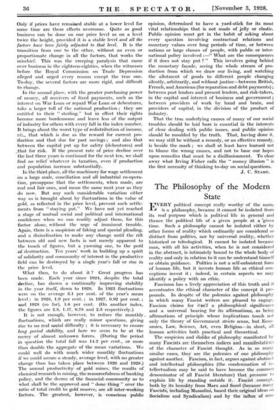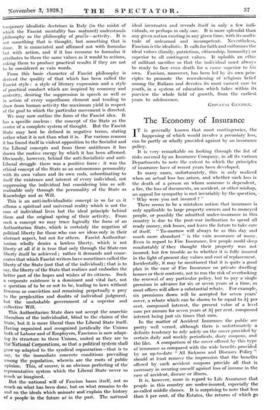The Philosophy of the Modern State
FVERY political concept really worthy of the name is a philosophy, because it cannot be -isolated- from its real purpose which is political life in .general and thence the political life of a given people. at a 'given time. Such a philosophy cannot be isolated either by other forms of reality which ordinarily are considered a distinct from politics, nor by universal. reality,. whether -historical or teleological. It cannot be isolated because man, with all his activities, when he is .not considered in the abstraet, is intimately bound to the whole body of reality and only in relation to it can he understand -himself or obtain gUidance. Politics is. not a self-subsistent form of human life; bUt it invests human life- as ethical con- ceptions invest it ; indeed, in certain aspects, we may identify a policy with -an ethic. .
Fascismo has a lively appreciation of-this truth and It accentuates the ethical character of the concept it pro- pounds. In despite of the polemics against ;philosophy in which many Fascist writers are pleased to .engage, Fascism claims for itself a philosophical: significance and a universal bearing for its affirmations, as being affirmations of principle whose implications.. touch not Only the theory of Government siricto sensu, but :Bean' omics, Law, Science, Art, even Religionin short, all human activities both practical and theoretical.
The suspicion and dislike of philosophy manifested by many Fascists are themselves indices and. manifestations of the character • of Fascist thought. As in. so many similar cases, they are the polemics of- one philosophy against another. Fascism, in fact, argues against abstract and intellectual philosophies (the condemnation of. in- tellectualism may be said to have become the common denominator of all Fascist literature) that presume to explain life by standing outside it. Fascist concept, both by its heredity from Marx and Sorel (because many Faseist4,-ineliding Mussolini, based their -original ideas on Socialism and Syndicalism) and by the influx of con- temporary idealistic doctrines in Italy (in -the midst of • whicll the 'Fascist mentality has matured) understands philosophy as the philosophy of pravis—activity. It is not something that is thought, but something that is done. It is enunciated and affirmed not with formulas but with action, and if it has recourse to forthulas it attributes to them the same values as it would to actions, asking them to produce practical results if they are not to be considered as vain words. From this basic character of Fascist philosophy is derived the quality of that which ,has been called the Fascist style : a style of literary expression and a style of practical conduct which are inspired by economy and austerity, desiring the suppression in speech as well as in action of every superfluous element and tending to draw from human activity the maximum yield in respect of the goal to which the particular movement is directed. We may now outline the form of the Fascist idea. It has a specific nucleus : the concept of the State as the centre of a complete system of thought. But the Fascist State may best be defined in negative terms, stating rather what it is not than what it is. For various reasons it has found itself in violent opposition to the Socialist and the Liberal concepts and from these antitheses it has drawn the motive energy by which it has been affirmed. Obviously, however, behind the anti-Socialistic and anti- Liberal struggle there was a positive force : it was the ethical concept of the State as an autonomous personality with its own values and its own ends, subordinating to itself the existence and interest of every individual, not suppressing the individual but considering him as self- realizable only through the personality of the State as Knowledge and as Will. This is an anti-individualistic concept in so far as it affirms a spiritual and universal reality which is not the , sum of individual lives but the ideal principle behind them and the original spring of their activity. From such • a concept we may trace logically the form of an Authoritarian • State, which is certainly the negation of political liberty for those who can see ideas only in their abstract aspect, but not for others. Fascist Authoritar- ianism wholly denies a lawless liberty, which is not liberty at all if it is true that only through the State can liberty itself be achieved ; rather it demands and conse-. crates that which Fascist writers have sometimes called the liberty of the State (not that of the individual) ; that is to say, the liberty of the State that realizes and embodies the better part of the hopes and wishes of its citizens. Such a corporate existence is a dominant and vital fact, not a question of to be or not to be, leading to laws without firmness or conviction and remaining perpetually a prey to the perplexities and doubts of individual judgment, but the unshakable government of a superior and collective' Will. • • This Authoritarian- State does not accept the anarchic liberalism of the individualist, blind to the claims of the State, but it is more liberal than the Liberal State itself. Having organized and recognized juridically the Unions both of Labour -and of Emplayers, Fascismo is now adapt- ing its structure to these Unions, united as they. are to the' National Corporations, so that a political system shall grow up adapted to the syndical organization—that is to say,- to the immediate concrete conditions prevailing among the population, wherein are the roots of public opinion. This, of course; is an obvious perfecting of the representative system which the Liberal State -never so ranch 'as imagined. • But the -national will of Fascism bases itself, not so much on what has been- done,- but on what remains to do and on the ideals which animate and :explain the history of a people in the future asp in the past. The national ideal incarnates and reveals itself in only- a few indi- viduals, or perhaps in only one. It is more splendid than any given nation existing in any given time, with its multi- tude of unlearned and incompetents Nevertheless, Fascism is the idealistic. It calls for faith and enthrones the ideal values (family, patriotism, citizenship, humanity) as superior to all contingent values. It upholds an ethic of militant sacrifice so that the individual must always be ready to face even death for a cause superior to his own. Fascism, moreover, has been led by its own prin- ciples to promote the reawakening of religious belief among the. Italians and devotes its most earnest care to youth, in a system of education which takes within its purview the whole field of growth, from the earliest years to adolescence. GIOVANNI GENTILE.



















































































































 Previous page
Previous page